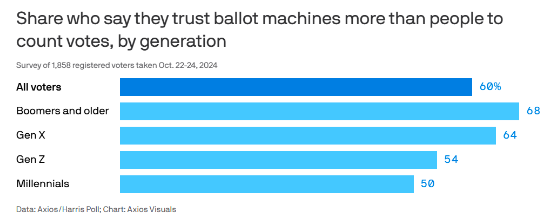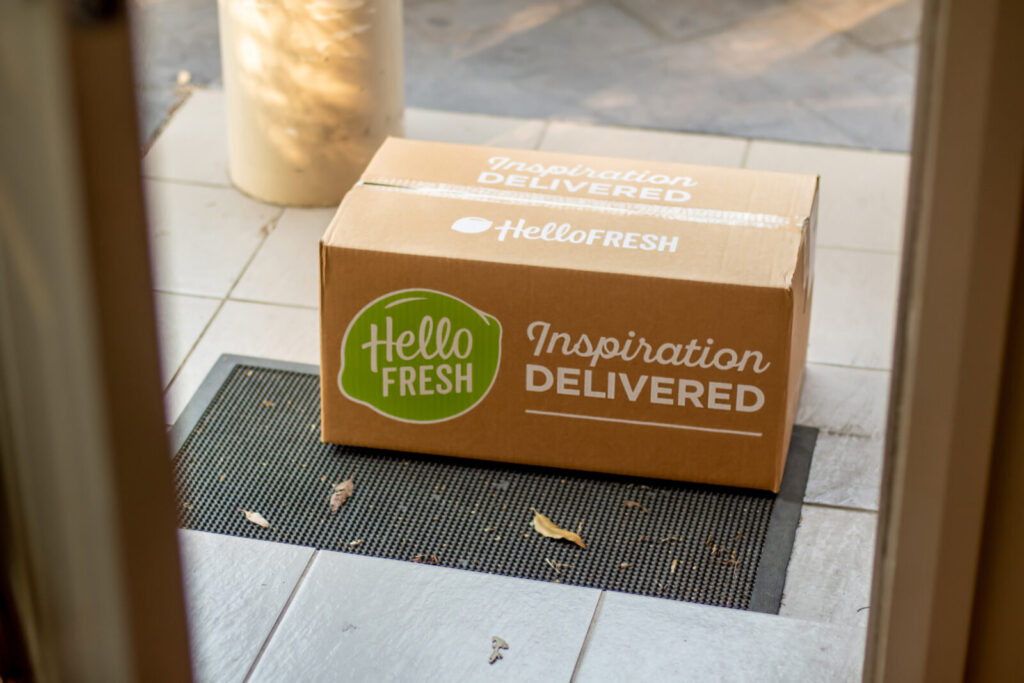Brief • 5 min Read
Machines or People? DEI Dealbreaker, Lost On Employer Health Plans, & Cross-Generational Friendships
The latest trends in society and culture from The Harris Poll
Marketers should take note of the lessons of the 2024 election. As we’ve seen across the globe, consumers are frustrated with post-COVID inflation and punishing incumbents. The results here were a referendum on the American Dream from voters who don’t think the status quo is working for them. It’s not just politicians facing backlash: consumers are also blaming companies for higher prices.
Growing economic and social division along educational lines leave those without higher education feeling increasingly marginalized and financially insecure. These consumers are seeking broader access to well-paying jobs, financial security, and a sense of stability and safety. They feel unheard and excluded in today’s economy and look for companies that understand their aspirations for a brighter future so they can take part in the promise of America.
This week, we have four new stories:
- Who do you trust most to have counted your ballot this week? We dive in with Axios.
- Where companies stand on DEI is a dealbreaker for job seekers.
- Open enrollment is here, and many are calling Mom and Dad for advice.
- Friendships know no age boundaries in my co-CEO’s latest op-ed.
Ballot Machine Skeptics: Axios Vibes From The Harris Poll
First, we found younger voters to be liars. Now, in this month’s Axios Vibes By The Harris Poll, we find out they were skeptics of ballot machines too.
- By the numbers: Overall, U.S. voters said they trust machines over people to count votes (60% to people over machines: 40%).
- Yet, Gen Z and Millennial voters are more skeptical about ballot-counting machines: The margin drops to (54% v. people: 46%) Gen Z voters – the same as Republican voters – among Millennials, trust in machines was even lower at (50%).

- Further, just (70%) of Gen Z voters — trust that their vote choices truly remain secret, with few Gen Z strongly trusting the privacy of their votes (v. Boomers+: 84%).
Takeaway: Young voters have come of age amid ‘Stop the Steal’ and the rampant accusations of voting machines being manipulated. This is all young voters know. There is more nuance to these findings, especially considering younger Americans’ daily reliance on and comfort with technology. Some may view clunky, simple-looking machines as too “low-tech” to trust – though, ironically, machines’ simple nature and use of paper ballots are believed to help protect their safety and accuracy.
Taking A Stand On DEI: Express Employment Professionals-Harris Poll
In our latest collaboration with Express Employment Professionals, featured in HR Dive, hiring managers are fielding questions about DEI, and jobseekers want employers to take a stand.
- DEI is an interview consideration: One in five (22%) hiring managers say candidates and current employees are asking about the company’s DEI efforts.
- Two-thirds (65%) of job seekers believe companies should speak out on critical issues, with half saying it’s important for their employers to take clear stances on topics important to them.
- DEI tops the list: The top concerns job seekers want companies to address publicly are diversity, equity, inclusion, and belonging (DEI) (37%), racism (35%), environmental issues (30%), and sexism (30%).
- U.S. hiring managers agree: Nearly two-thirds (65%) feel companies should take a stance on specific issues – particularly DEI (30%) and racism (30%).
Takeaway: The findings come in a year when some corporations have scaled back – or in some instances, gutted – their DEI programs. Employers must carefully consider which issues to take a stance on based on their values and shareholder needs, said Bill Stoller, Express Employment International CEO: “It’s about finding the right balance between staying true to the company’s mission and addressing the concerns that matter most to their employees and customers.”
Mom, Dad, What Benefits Do I Need? Justworks-Harris Poll
Gen Z are relying on their parents later in life, which apparently includes when it’s time to pick their employer-sponsored health insurance plans, as seen by our work with Justworks, featured in Newsweek.
- Nearly half (47%) of younger Americans relied on their parents’ guidance to choose their employer health benefits (Gen Z: 57%, Millennials: 44%).
- And more than half of Gen Z/Millennials (51%) admitted to blindly choosing a health insurance plan because they didn’t understand the complicated terms and definitions.
- However, the confusion around choosing a plan often leads to regret: Nearly half (46%) of younger Americans say they’ve regretted choices made during open enrollment, compared to a quarter of Gen X+ Americans.
- Calling on HR: More than four in five (81%) said they felt that HR departments should provide employees with more help during the open enrollment process.
Takeaway: “I think it’s more the result of many younger people who want to learn from the pitfalls their parents and grandparents have made in prior years when choosing which insurance product is best for them,” says financial literacy instructor Alex Beene. “Gen Z has grown up in a world where, more often than not, they hear their parents and other elders in their family complain about rising insurance prices, less coverage, and unexpected problems that occur when seeking health care and its subsequent reimbursement.”
You’ve Got A Friend In Me: Houston Chronicle-Harris Poll
As political polarization deepened this election cycle, where can America find hope? The answer might lie with the intergenerational friendships seen by Lady Gaga & Tony Bennett, George W. Bush & Michelle Obama, and Martha Stewart & Snoop Dogg, says our Harris Poll co-CEO Will Johnson and Director of the Human Flourishing Lab at the Archbridge Institute, Clay Routledge.
- Crossing generational lines: (70%) of Americans report having intergenerational relationships.
- These friendships could cure loneliness: (60%) of those with such friendships say they’ve expanded their social circles, and (55%) say they’ve experienced increased companionship.
- Cultivating more and deeper intergenerational friendships offers a path forward: (49%) of those who have cross-generational friendships report broadened perspectives and improved emotional health (45%).
Takeaway: “Younger generations, as the literal embodiment of our nation’s future, inspire older Americans to remain invested in long-term progress. In turn, the wisdom and historical perspective of older generations can help temper the cynicism that often plagues youth,” writes Johnson and Routledge. “Who knows? Your own Bennett-Gaga, Bush-Obama, or Stewart-Snoop friendship might be just around the corner, ready to enrich your life and shape our shared future.”
Subscribe for more Insights
Subscribe to our newsletter for the latest trends in business, politics, culture, and more.
Related Content









